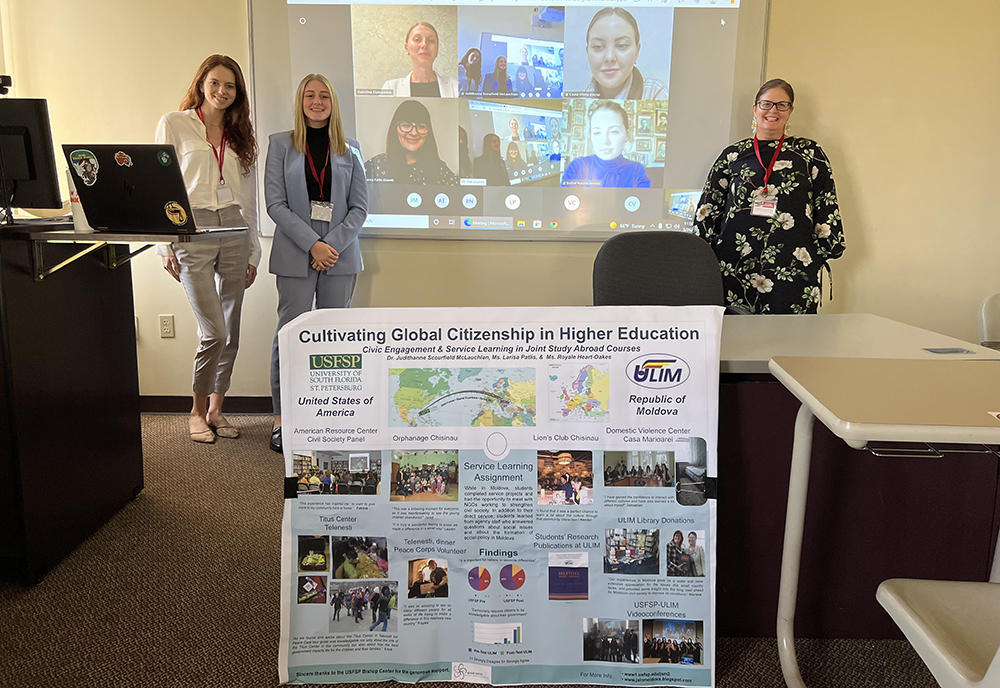
Political Science Professor Judithanne Scourfield McLauchlan (right) and USF students highlight international research they are conducting with students and faculty in Moldova.
USF students collaborate with peers in Moldova during international crisis
In the midst of war and with an international humanitarian crisis on their doorstep, law students from Moldova are collaborating on research with USF St. Petersburg campus students in an effort to form cultural bonds during a time of chaos.
Planning for this global classroom experience with students from the Universitatea Libera Internationala din Moldova (ULIM), or the Free International University of Moldova, began a year ago as faculty from the two institutions began developing the syllabus. The first joint meeting of the global class was to originally take place on February 23, but was pushed back a week. The next day, February 24, Russia invaded nearby Ukraine.
World events completely altered the context of the international collaboration and put in doubt if it would even happen. But USF Political Science Professor Judithanne Scourfield McLauchlan, the organizer of this collaboration who was a Fulbright Scholar in Moldova in 2010 and 2012, said that by continuing, it has provided tremendous benefits for everyone involved.
“I believe this project has given students at ULIM some sense of normalcy and that we can be a source of support and solidarity during these tremendously challenging times,” she said. “Despite having a war at your door step and massive amounts of refugees coming into the country, it’s been heartwarming to see the Moldovan students’ response and how our USF students have connected with them.”
Students in the two countries meet for virtual classroom discussions to compare and contrast civil liberty decisions of the U.S. Supreme Court and the European Court of Human Rights involving similar legal questions. They are also working together in smaller research groups using Facebook Messenger, Whats App and Google Docs to delve further into specific issues, from the right to a fair trial to the freedom of assembly and speech.
All the while, the backdrop of war has posed significant challenges for the collaboration.
“For our research partners in Moldova, missile strikes can be heard in the distance. Hundreds of thousands of refugees fleeing the war in Ukraine have crossed Moldova's borders. Russian strikes against nuclear plants instill fear of nuclear contamination that will spread to Moldova (and throughout Europe),” McLauchlan wrote on a blog post for the class.
Despite these challenges, the global research partnership continues because of the perseverance of the students and faculty in Moldova.
“This is a valuable opportunity for me because I have the chance and possibility to see and hear from other points of view, forming relationships and keeping in touch with others in a different country,” said Natalia Bodiul, a third-year law student in Moldova who has also hosted several refugees from Ukraine in her home in recent weeks. “We have different experiences and sources of information, but we can share and through that improve ourselves.”
Since the start of the collaboration, McLauchlan and several students from Moldova and USF presented on how to develop collaborative international research projects at the Florida Political Science Association Meeting in March. Students have also highlighted work they have done on their civil liberty research during the USF St. Petersburg campus Undergraduate Research Conference on April 11 and will do so at a corresponding virtual symposium hosted by ULIM on April 20 and a virtual roundtable discussion hosted by the U.S. Embassy America House in Moldova on May 6.
The class will conclude with students submitting research papers and posters, and possibly having their work published in ULIM’s law journal. And this summer, McLauchlan is working on a study about the impact of global classroom projects on the development of students’ understanding of global issues, supported by a grant from USF's Center for Innovative Teaching & Learning.
Beyond the research, students say the most valuable lessons they have learned so far is forming bonds with others from a different culture and at a historic time.
“This experience has been valuable to work with others our own age and who have similar interests on the other side of the globe,” said Taylor Herman, a first-year political science major at USF. “It has also been inspiring to work with and see how they have dealt with the conflict happening so geographically close to them, getting to know these students and forming connections even with the differences in culture and circumstances.”
The experience has also confirmed that even in the darkest of times, especially during those times, the value of education.
“For me, it’s so important to get an education, because we can change the situation when we change our type of thinking,” Bodiul said.
No comments:
Post a Comment